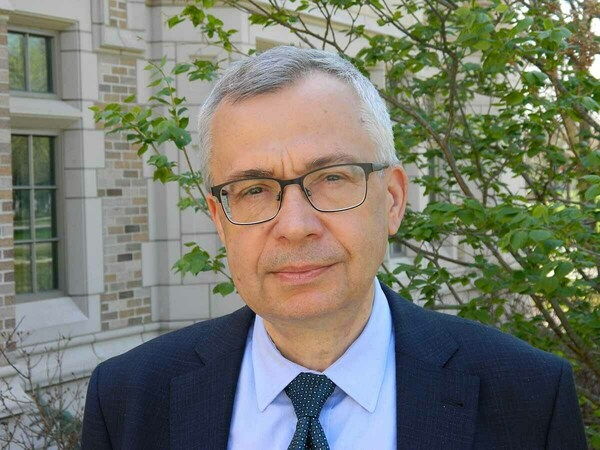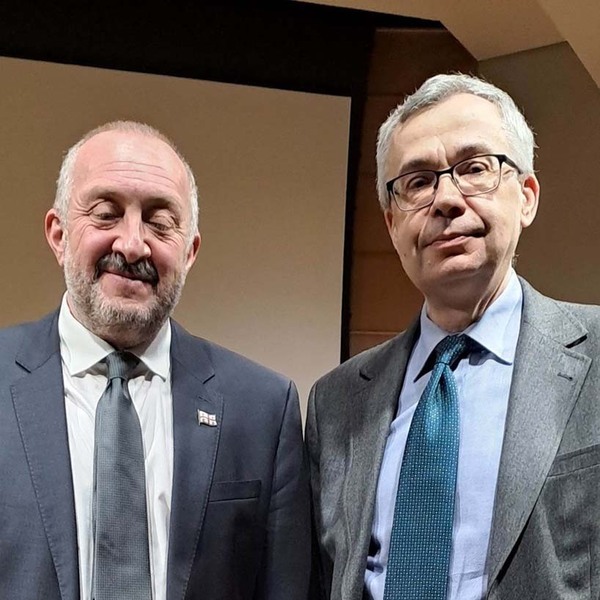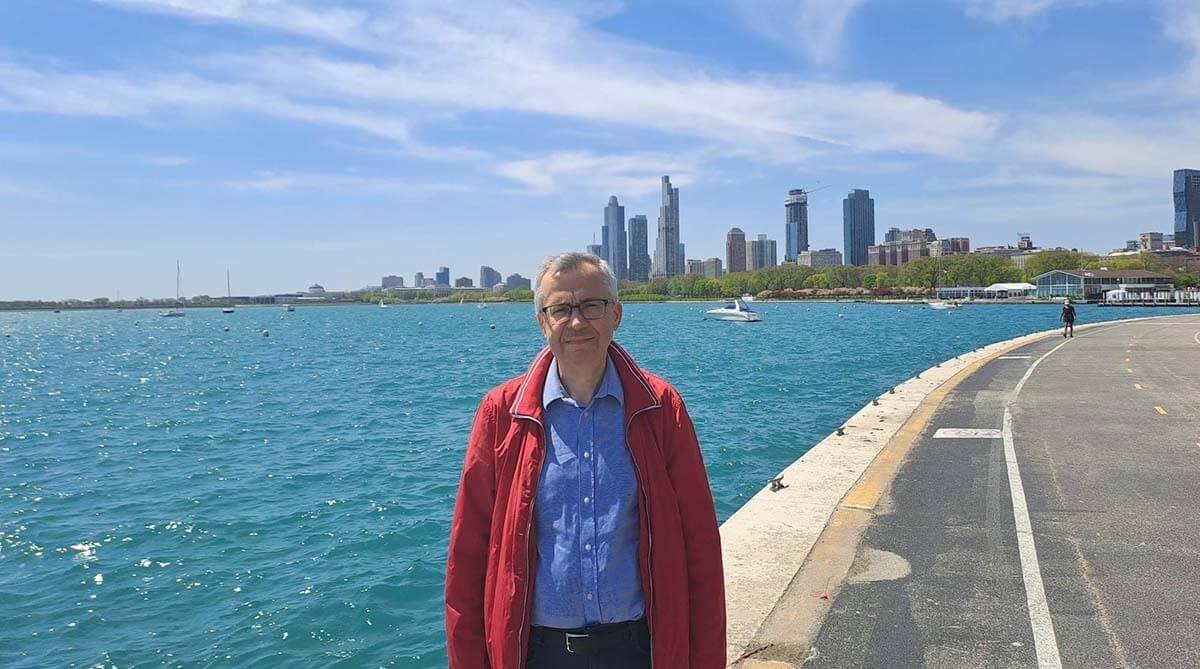
Andrzej Podraza is head of the Department of International Relations and Security at John Paul II Catholic University of Lublin, a member of the Catholic Universities Partnership. In 2022-23, he was a visiting fellow at the Nanovic Institute for European Studies. Here he reflects upon his time at Nanovic and the University of Notre Dame as a researcher, educator, and community member.
I was supposed to come to the University of Notre Dame during the academic year 2020-21, but, thanks to COVID-19, I did not take up my position as a visiting fellow at the Nanovic Institute for European Studies until the spring of 2023. From the very beginning, my experience at the university was a positive one, not least of all because of how many kind staff and faculty helped me overcome the complex administrative matters that occupy the settling-in period. I liked the beautiful and large campus, which is like a completely separate city. Of course, the campus comprises not only buildings but also, most importantly, its people: students, academics, and administrative staff.
Everyone goes in their direction, striving to achieve their goals, but at the same time, there is a sense of community – not only in the scientific but also in the spiritual dimension. After all, the University of Notre Dame is a Catholic university. The Basilica of the Sacred Heart plays an important role with its solemn atmosphere of holy masses, during which one can hear one of the university’s beautiful choirs. Certainly, these masses offer a significant spiritual strengthening, so that one can face the problems of everyday life fortified.
Researching transatlantic relations at Notre Dame
My visiting fellowship was primarily intended for conducting research on relations between the United States and Central European countries in the 21st century in the context of the transformation of the European security architecture, particularly as regards NATO and the European Union. The thematic scope of my research is quite wide, so my planned output includes several political science articles and, ultimately, a scientific monograph.
One of the important elements of my analysis is the war in Ukraine, which is the result of the development of neo-imperial policy by Russia. During my stay at the University of Notre Dame, I focused primarily on answering the extremely important question of why, in February 2022, Russia invaded Ukraine, which resulted in the outbreak of war in Europe. Not so long ago, that would have seemed unlikely in this part of the world. An attempt to analyze this issue is, of course, not easy, because in addition to solid sources, one also needs to demonstrate what I would call scientific intuition, which must be supported by appropriate methodological and theoretical preparation.
The Hesburgh Library turned out to be a significant support in the implementation of the research project. Its staff and resources have made it possible for me to access a huge number of publications, books, and articles, in many cases online, which is extremely important. If a publication is not held by the library, one can ask for the purchase of necessary books, and such requests are fulfilled very quickly by friendly librarians.
Regarding Ukraine, however, Putin miscalculated. Although it is difficult to give an unambiguous answer to the question of when and how Russia’s aggression against Ukraine will end, it is very clear that Putin’s actions have led to outcomes that he did not intend or foresee.
This is not the time to present detailed research results, but perhaps I might offer a few reflections. Vladimir Putin’s decision to attack Ukraine in 2022 was influenced by many factors. These include such issues as the confidence in a quick victory; the conviction about the weakness of the West and an expectation that those nations would not react strongly; the energy dependence of Europe, especially Germany, on Russia; and the success of Russia’s disinformation activities. Since August 1999, Putin has maintained a position as either Russia’s prime minister or its president. In that time, he has dealt with as many as five American presidents. Despite Russia’s objective weaknesses compared to the U.S., this has given him an advantage in setting and implementing long-term goals in domestic and foreign policy. American presidents adopted a specific pattern in how they developed relations with Russia; despite their critical attitude toward some of Russia’s actions, they initially sought to normalize relations with Moscow, treating Vladimir Putin as an almost normal democratic politician. This approach, of course, gave Putin an advantage, as he sought to achieve his own goals in foreign policy consistently and with cold calculation. American disappointment with Putin’s actions usually arose over time and their policies tightened, but the next American president typically reset relations with Russia when he came into office.
Regarding Ukraine, however, Putin miscalculated. Although it is difficult to give an unambiguous answer to the question of when and how Russia’s aggression against Ukraine will end, it is very clear that Putin’s actions have led to outcomes that he did not intend or foresee. The U.S. and other Western countries strongly support Ukraine, which has become even closer to the Atlantic Alliance and the EU. NATO has increased its presence on the Eastern flank and has expanded to Finland and soon, one hopes, to Sweden, and the Ukrainians themselves have consolidated as a nation in the face of brutal Russian aggression. Russia has largely isolated itself. To a large extent, the war in Ukraine shows the strength of democracy versus authoritarianism.
Encountering Notre Dame’s students

In addition to research, I also taught a 3-credit course for undergraduate students. It was quite intensive as I was meeting eight students twice a week throughout the spring term. The course was titled “Central Europe and the Transatlantic Security Relationship after the End of the Cold War” and its thematic scope was quite wide. I wanted to show the geopolitical position of Central Europe in relation to changes in the international environment in the last three decades. The course emphasized the analysis of Central Europe in the context of the transformation of the Atlantic Alliance and the EU and many contemporary security challenges and threats, such as international terrorism, the migration crisis, the war in Ukraine, access to energy carriers, the strategic rivalry between the United States and China, and other issues.
During one class, we hosted Giorgi Margvelashvili, President of Georgia from 2013-18. This meeting led to a very interesting discussion not only on Georgia’s foreign and domestic policy but also on Russia’s activities in Ukraine and Transcaucasia. Judging by the students’ evaluation, they found my course interesting. From my perspective, it was a fascinating experience. I realized that it is worth getting to know how young people coming of age in another part of the world, who may even be future American diplomats, think about the current state of things and how they perceive the problems of Europe, and in particular Central Europe.
During my stay at the University of Notre Dame, I also supervised one undergraduate student who was preparing a capstone paper in European studies. The subject of the paper was fascinating — “Germany’s Foreign Policy in the 21st Century as a Factor Enabling the Development of Russia’s Neo-Imperial Policy Toward Ukraine.” The paper dealt with an interesting and current problem in the context of Russia’s aggression against Ukraine in both 2014 and 2022. I rated this paper very highly, and our conversations about the research problem and the possibilities for solving it were very inspiring.
From an academic point of view, my stay at the University of Notre Dame was very important to me. It is also worth emphasizing the great kindness of the staff of the Nanovic Institute and the benefits of being able to participate in many scientific meetings and discussions organized both by the institute and other departments, centers, institutes, and units of the university. Certainly, the University of Notre Dame creates great conditions for integral development — both spiritual and scientific — for students and academics.

Originally published by at crossingthesquare.nd.edu on July 07, 2023.